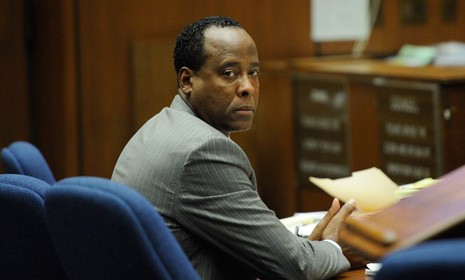The Conrad Murray verdict: 5 takeaways
Michael Jackson's doctor is guilty of involuntary manslaughter in the musician's drug-induced death. What can we learn from the highly publicized trial?

A free daily email with the biggest news stories of the day – and the best features from TheWeek.com
You are now subscribed
Your newsletter sign-up was successful
After 22 days of testimony and less than two days of deliberation, a jury found Michael Jackson's personal doctor, Conrad Murray, guilty of involuntary manslaughter on Monday, nearly two and a half years after the singer's drug-related death. Prosecutors argued that Murray was grossly negligent in administering an anesthetic called propofol to help Jackson sleep. A fatal dose of the powerful drug, normally used for surgery, was ruled to be the main cause of the King of Pop's death at age 50. (The defense argued that Jackson delivered the fatal dose himself.) Here, five takeaways from the highly publicized trial:
1. Murray came across as "money hungry" and negligent
Murray, who was paid $150,000 a month to work as Jackson's personal physician, was vilified for veering "significantly from acceptable medical practice at nearly every turn," says Jennifer Medina at The New York Times. He's a primary care physician, not an anesthesiologist, and thus should not have been administering propofol at all. He also kept no records of administering the drug, did not use proper monitoring equipment, failed to immediately call 911 after discovering the singer unconscious, and didn't alert paramedics on the scene about Jackson's propofol use.
The Week
Escape your echo chamber. Get the facts behind the news, plus analysis from multiple perspectives.

Sign up for The Week's Free Newsletters
From our morning news briefing to a weekly Good News Newsletter, get the best of The Week delivered directly to your inbox.
From our morning news briefing to a weekly Good News Newsletter, get the best of The Week delivered directly to your inbox.
2. The prosecution did a "masterful job"
To legal experts, the guilty verdict came as no surprise, says Richard Winton at the Los Angeles Times. During the four-week case, prosecutors portrayed Murray as a "deceptive and incompetent doctor who abandoned his medical judgment" by administering a surgical drug to Jackson in order to help him sleep. The prosecution brought in key witnesses who testified to "many egregious medical missteps," which experts said led directly to Jackson's death. "The D.A. did a masterful job in prosecuting the case," Deputy District Attorney Dmitry Gorin tells the Los Angeles Times.
3. The trial will tarnish Jackson's legacy
For stars of Jackson's stature, says David Robson at the U.K.'s Telegraph, death opens you up to more of the scrutiny that the public feels entitled to. The chilling details presented during the trial "become legally certified facts to set against the miasma of rumor and speculation." Each day of the trial brought Jackson "closer to the pantheon of real-life tragic figures like Marilyn Monroe and Elvis Presley, who, with the passage of years, increasingly have become more known for how they died rather than their talent in life," says Jere Hester at NBC Connecticut.
A free daily email with the biggest news stories of the day – and the best features from TheWeek.com
4. But America was not obsessively absorbed by this trial
The trial spectacle "didn't seem to interest the normally voracious consumers of celebrity trash," says Sharon Waxman at The Wrap. It didn't dominate tabloids, drove little traffic to TMZ, was absent from water cooler conversations and late-night monologues, and failed to seize Nancy Grace's attention the way the Casey Anthony trial did. That may be because the trial revisited "a sordid picture of Michael Jackson we no longer wanted to see," one that was forgotten with the public outpouring of grief following his death. The trial's conclusion therefore felt more like a "hollow victory" than "catharsis."
5. Murray may get off easy
He'll be sentenced on Nov. 29. Legal experts estimate that Murray could spend less than a year behind bars, benefiting from a new California law meant to reduce prison overcrowding. The minimum sentence is probation, and the maximum is four years in state prison. Plus, low-risk prison inmates are often sent to county jails, which have been releasing inmates early because of lack of space. "I'd be surprised if a year from today, Conrad Murray was still behind bars," law school professor Stan Goldman tells Reuters. His defense team is also planning to appeal the conviction, says Alan Duke at CNN.
-
 Quentin Deranque: a student’s death energizes the French far right
Quentin Deranque: a student’s death energizes the French far rightIN THE SPOTLIGHT Reactions to the violent killing of an ultra-conservative activist offer a glimpse at the culture wars roiling France ahead of next year’s elections.
-
 Secured vs. unsecured loans: how do they differ and which is better?
Secured vs. unsecured loans: how do they differ and which is better?the explainer They are distinguished by the level of risk and the inclusion of collateral
-
 ‘States that set ambitious climate targets are already feeling the tension’
‘States that set ambitious climate targets are already feeling the tension’Instant Opinion Opinion, comment and editorials of the day